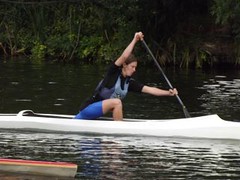Samantha Rippington, an elite female canoeist from Reading, England has launched an English High Court challenge to the London Organising Committee of the Olympic Games (LOCOG’s) refusal to carry out an equalities audit of the Olympic sports programme.
Ms Rippington, who has on a number of occasions been selected to represent Great Britain at the canoeing World Championships, wants LOCOG to examine the gender bias in the Olympic sports programme, including the Olympic canoeing programme, which leaves out women’s canoeing events despite featuring a number of men’s canoe events.
Ms Rippington argues in her claim for judicial review that the Equality Act 2010 requires LOCOG to carry out an “equality impact assessment” of the Olympic sports programme, including canoeing. This, she argues, is necessary to demonstrate compliance with the public sector equality duty contained in section 149 of the Equality Act, according to which public authorities must, “in the exercise of [their] functions, have due regard to the need to… eliminate discrimination, advance equality of opportunity… [and] foster good relations between [women and men]…”
She claims that LOCOG’s refusal to carry out the assessment, in a letter to her lawyers in April 2012, is in breach of section 149 of the Equality Act.
Prior to starting her legal action, Ms Rippington said, “All I am asking is that LOCOG answer two simple questions: is it discriminatory for there to be five men’s Olympic canoe events but none for women?; and should that situation continue? As a female canoeist who could potentially compete at the Olympics I know what my answers are, but why won’t the people who are responsible for staging these Olympics give us their answers too? I think that the international bodies who decide the Olympic sports programme also need to bring themselves to address these simple questions. Olympic canoeing, both sprint and slalom, is very technical. It takes years to learn the techniques correctly and both the athletes and coaches require a lot of dedication. Not being an Olympic sport means lower levels of funding, support and training opportunities than the men, which makes progression, both individually and in terms of the sport itself, very difficult.“
Ms Rippington spoke from the Women Canoe Cup, an international women’s canoeing event in Boulogne Sur Mer, France, which is hosted as a focal point for elite and developing female canoeists who have no Olympic event in which to compete.
LOCOG claims that it does not have to comply with section 149 of the Equality Act because it is a ‘private entity not carrying out governmental functions’; because it does not control the content of the Olympic sports programme; and because the assessment would ‘serve no purpose,’ as it is not feasible at this stage to change the Olympic sports programme.
Pages: 1 · 2
More Articles
- Jo Freeman Reviews: Justice, Justice Thou Shalt Pursue: A Life’s Work Fighting for a More Perfect Union By Ruth Bader Ginsburg and Amanda Tyler
- Berggruen Prize for Philosophy & Culture Awarded to Supreme Court Justice Ruth Bader Ginsburg for Her Work in Pioneering Gender Equality and Strengthening the Rule of Law
- How Gender Stereotypes Influence Emerging Career Aspirations
- Where Does the US Rank in Gender Equality; Think Nordic
- When Does It End? Gender Equalities in 22 Nations
- More Women On UK Company Boards; Could It have Made a Difference in the Banking Crisis?






